Impact of Globalisation on Businesses and Economy
VerifiedAdded on 2022/11/07
|6
|1422
|114
AI Summary
This paper evaluates the impact of Globalisation on businesses and economy. It discusses how globalisation has enabled modern businesses to take different approach from its predecessors, where business corporations have progressively turned towards specialisation.
Contribute Materials
Your contribution can guide someone’s learning journey. Share your
documents today.
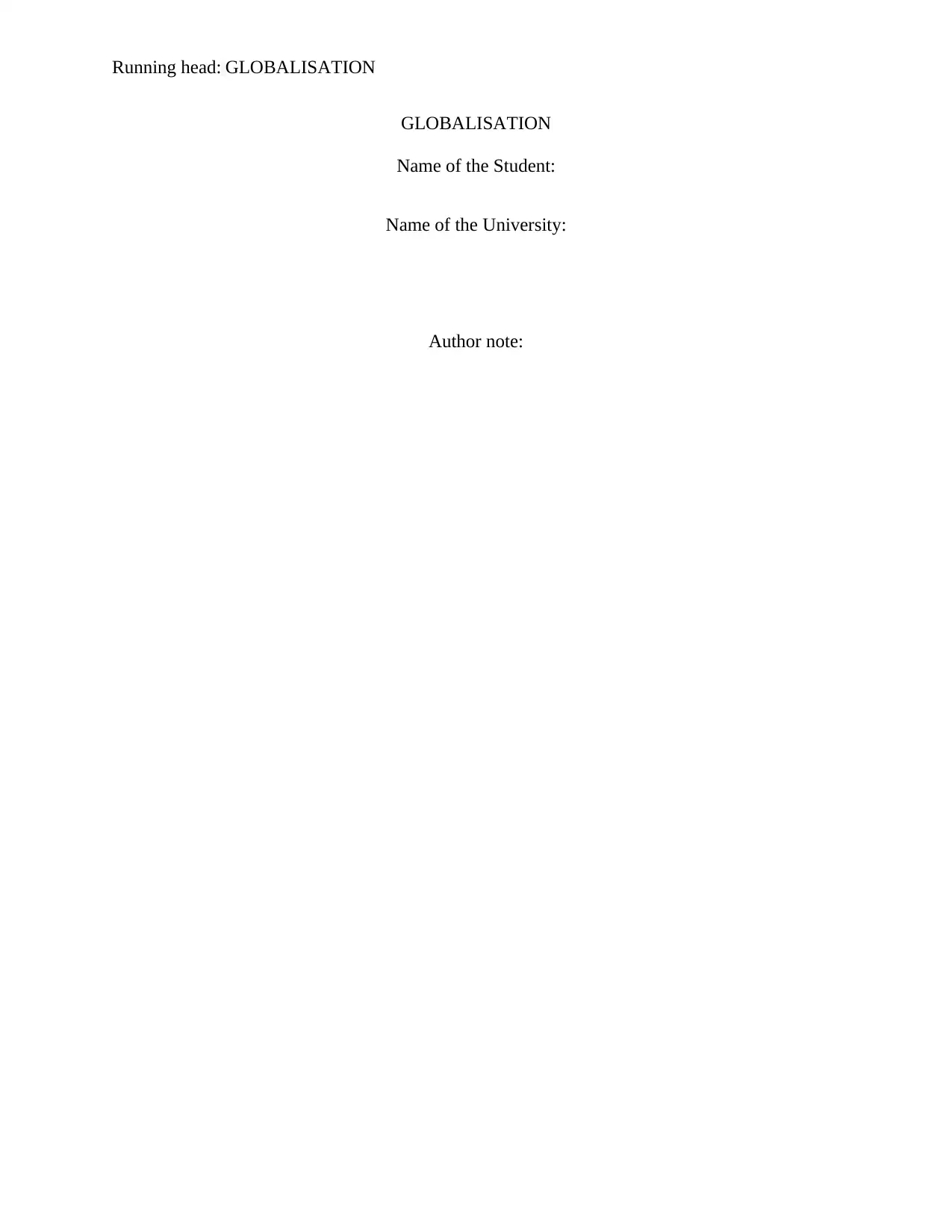
Running head: GLOBALISATION
GLOBALISATION
Name of the Student:
Name of the University:
Author note:
GLOBALISATION
Name of the Student:
Name of the University:
Author note:
Secure Best Marks with AI Grader
Need help grading? Try our AI Grader for instant feedback on your assignments.
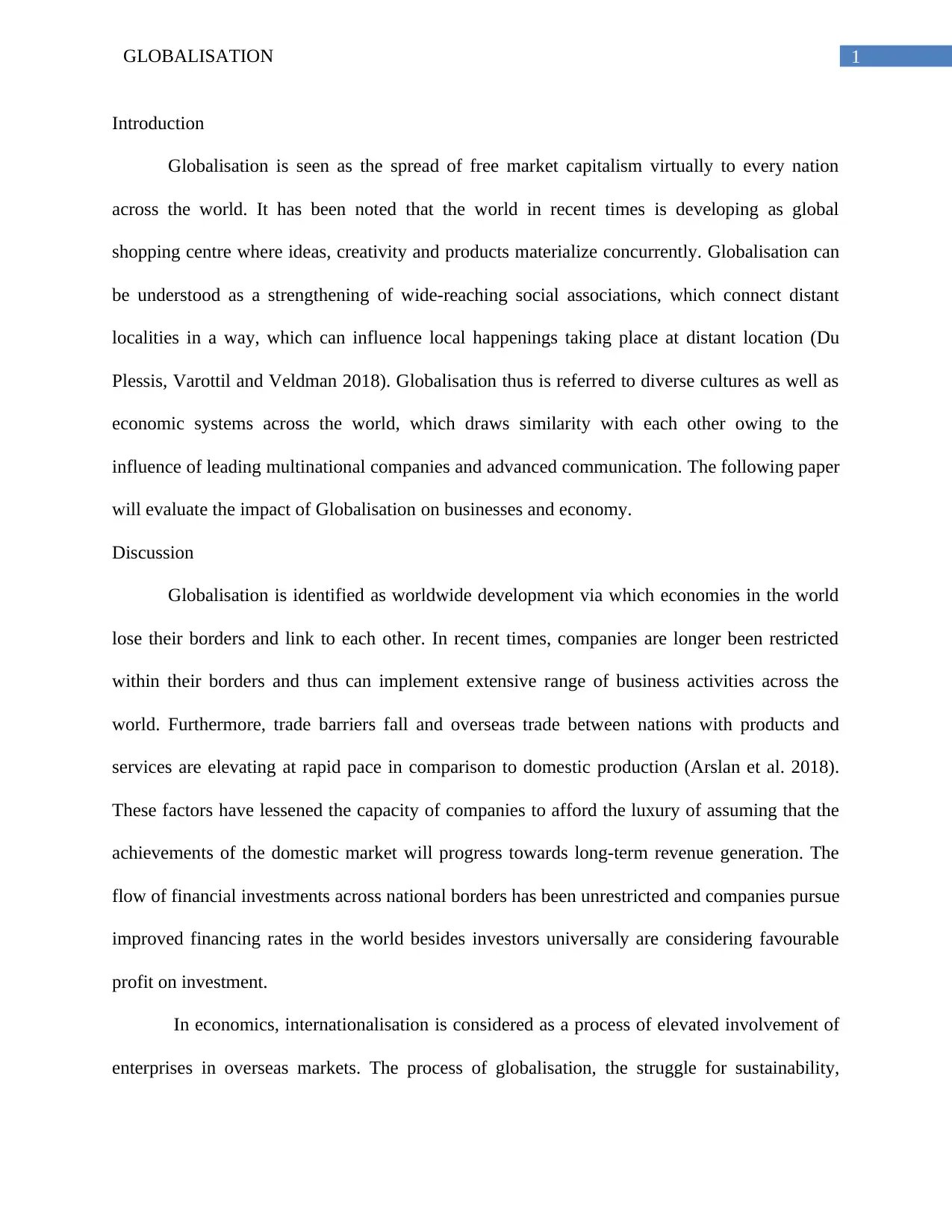
1GLOBALISATION
Introduction
Globalisation is seen as the spread of free market capitalism virtually to every nation
across the world. It has been noted that the world in recent times is developing as global
shopping centre where ideas, creativity and products materialize concurrently. Globalisation can
be understood as a strengthening of wide-reaching social associations, which connect distant
localities in a way, which can influence local happenings taking place at distant location (Du
Plessis, Varottil and Veldman 2018). Globalisation thus is referred to diverse cultures as well as
economic systems across the world, which draws similarity with each other owing to the
influence of leading multinational companies and advanced communication. The following paper
will evaluate the impact of Globalisation on businesses and economy.
Discussion
Globalisation is identified as worldwide development via which economies in the world
lose their borders and link to each other. In recent times, companies are longer been restricted
within their borders and thus can implement extensive range of business activities across the
world. Furthermore, trade barriers fall and overseas trade between nations with products and
services are elevating at rapid pace in comparison to domestic production (Arslan et al. 2018).
These factors have lessened the capacity of companies to afford the luxury of assuming that the
achievements of the domestic market will progress towards long-term revenue generation. The
flow of financial investments across national borders has been unrestricted and companies pursue
improved financing rates in the world besides investors universally are considering favourable
profit on investment.
In economics, internationalisation is considered as a process of elevated involvement of
enterprises in overseas markets. The process of globalisation, the struggle for sustainability,
Introduction
Globalisation is seen as the spread of free market capitalism virtually to every nation
across the world. It has been noted that the world in recent times is developing as global
shopping centre where ideas, creativity and products materialize concurrently. Globalisation can
be understood as a strengthening of wide-reaching social associations, which connect distant
localities in a way, which can influence local happenings taking place at distant location (Du
Plessis, Varottil and Veldman 2018). Globalisation thus is referred to diverse cultures as well as
economic systems across the world, which draws similarity with each other owing to the
influence of leading multinational companies and advanced communication. The following paper
will evaluate the impact of Globalisation on businesses and economy.
Discussion
Globalisation is identified as worldwide development via which economies in the world
lose their borders and link to each other. In recent times, companies are longer been restricted
within their borders and thus can implement extensive range of business activities across the
world. Furthermore, trade barriers fall and overseas trade between nations with products and
services are elevating at rapid pace in comparison to domestic production (Arslan et al. 2018).
These factors have lessened the capacity of companies to afford the luxury of assuming that the
achievements of the domestic market will progress towards long-term revenue generation. The
flow of financial investments across national borders has been unrestricted and companies pursue
improved financing rates in the world besides investors universally are considering favourable
profit on investment.
In economics, internationalisation is considered as a process of elevated involvement of
enterprises in overseas markets. The process of globalisation, the struggle for sustainability,
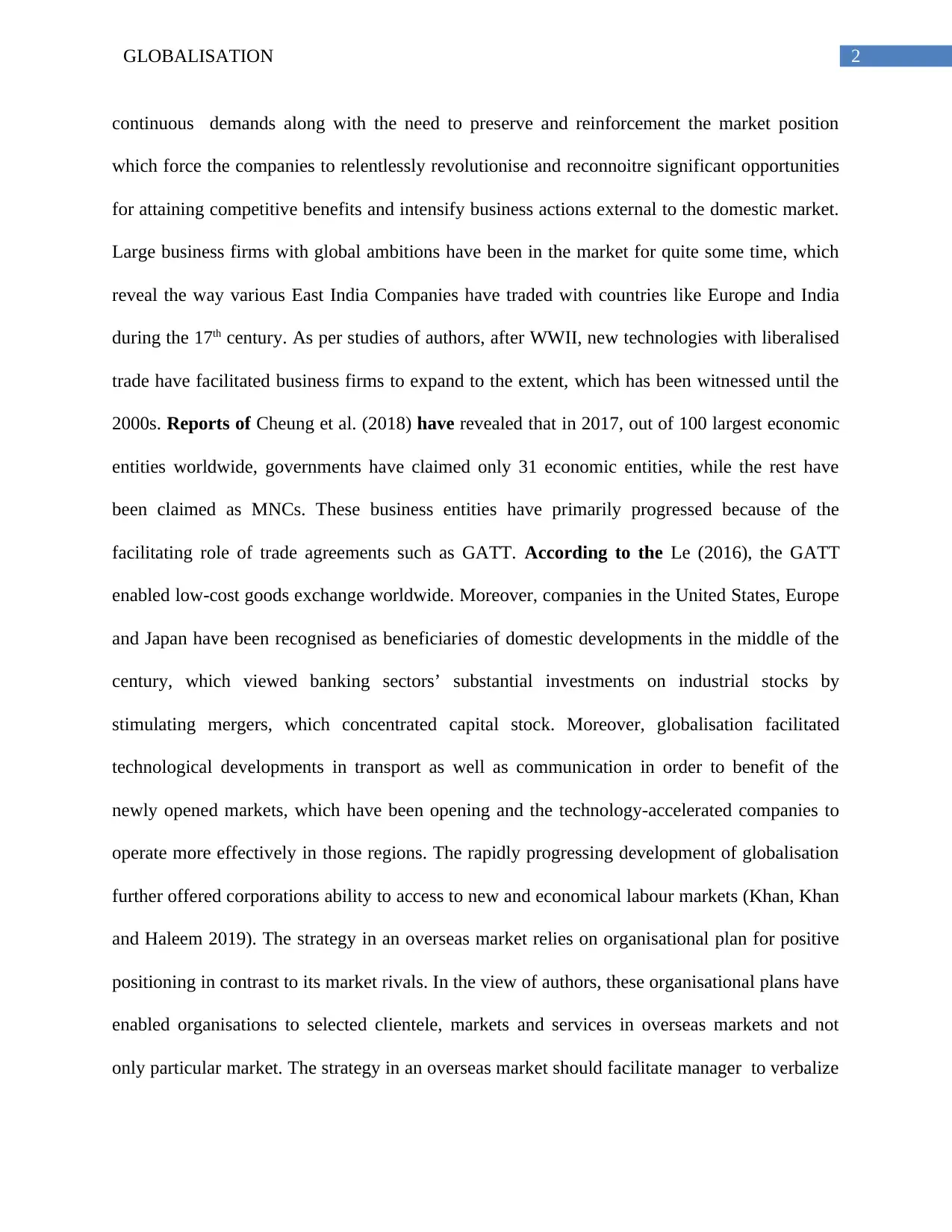
2GLOBALISATION
continuous demands along with the need to preserve and reinforcement the market position
which force the companies to relentlessly revolutionise and reconnoitre significant opportunities
for attaining competitive benefits and intensify business actions external to the domestic market.
Large business firms with global ambitions have been in the market for quite some time, which
reveal the way various East India Companies have traded with countries like Europe and India
during the 17th century. As per studies of authors, after WWII, new technologies with liberalised
trade have facilitated business firms to expand to the extent, which has been witnessed until the
2000s. Reports of Cheung et al. (2018) have revealed that in 2017, out of 100 largest economic
entities worldwide, governments have claimed only 31 economic entities, while the rest have
been claimed as MNCs. These business entities have primarily progressed because of the
facilitating role of trade agreements such as GATT. According to the Le (2016), the GATT
enabled low-cost goods exchange worldwide. Moreover, companies in the United States, Europe
and Japan have been recognised as beneficiaries of domestic developments in the middle of the
century, which viewed banking sectors’ substantial investments on industrial stocks by
stimulating mergers, which concentrated capital stock. Moreover, globalisation facilitated
technological developments in transport as well as communication in order to benefit of the
newly opened markets, which have been opening and the technology-accelerated companies to
operate more effectively in those regions. The rapidly progressing development of globalisation
further offered corporations ability to access to new and economical labour markets (Khan, Khan
and Haleem 2019). The strategy in an overseas market relies on organisational plan for positive
positioning in contrast to its market rivals. In the view of authors, these organisational plans have
enabled organisations to selected clientele, markets and services in overseas markets and not
only particular market. The strategy in an overseas market should facilitate manager to verbalize
continuous demands along with the need to preserve and reinforcement the market position
which force the companies to relentlessly revolutionise and reconnoitre significant opportunities
for attaining competitive benefits and intensify business actions external to the domestic market.
Large business firms with global ambitions have been in the market for quite some time, which
reveal the way various East India Companies have traded with countries like Europe and India
during the 17th century. As per studies of authors, after WWII, new technologies with liberalised
trade have facilitated business firms to expand to the extent, which has been witnessed until the
2000s. Reports of Cheung et al. (2018) have revealed that in 2017, out of 100 largest economic
entities worldwide, governments have claimed only 31 economic entities, while the rest have
been claimed as MNCs. These business entities have primarily progressed because of the
facilitating role of trade agreements such as GATT. According to the Le (2016), the GATT
enabled low-cost goods exchange worldwide. Moreover, companies in the United States, Europe
and Japan have been recognised as beneficiaries of domestic developments in the middle of the
century, which viewed banking sectors’ substantial investments on industrial stocks by
stimulating mergers, which concentrated capital stock. Moreover, globalisation facilitated
technological developments in transport as well as communication in order to benefit of the
newly opened markets, which have been opening and the technology-accelerated companies to
operate more effectively in those regions. The rapidly progressing development of globalisation
further offered corporations ability to access to new and economical labour markets (Khan, Khan
and Haleem 2019). The strategy in an overseas market relies on organisational plan for positive
positioning in contrast to its market rivals. In the view of authors, these organisational plans have
enabled organisations to selected clientele, markets and services in overseas markets and not
only particular market. The strategy in an overseas market should facilitate manager to verbalize
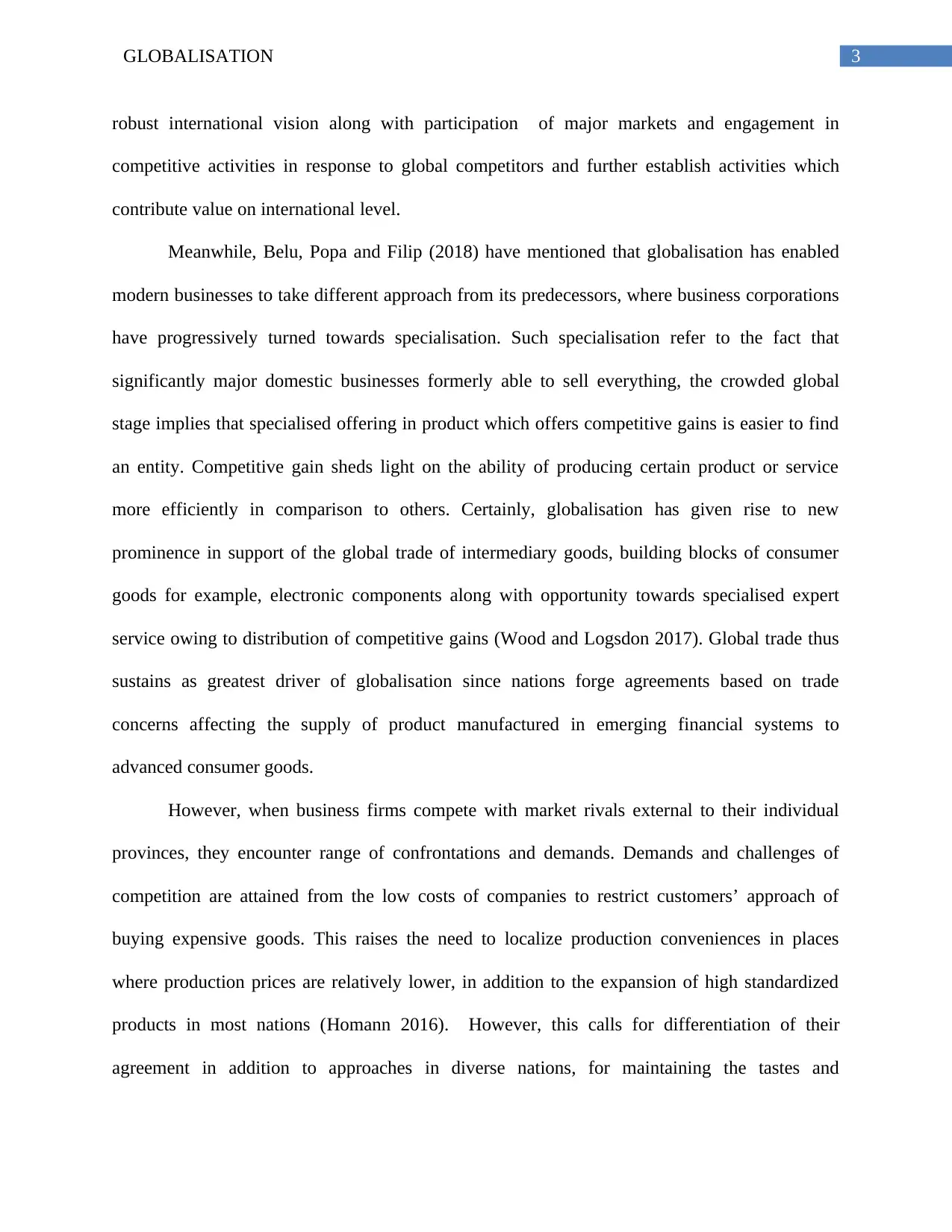
3GLOBALISATION
robust international vision along with participation of major markets and engagement in
competitive activities in response to global competitors and further establish activities which
contribute value on international level.
Meanwhile, Belu, Popa and Filip (2018) have mentioned that globalisation has enabled
modern businesses to take different approach from its predecessors, where business corporations
have progressively turned towards specialisation. Such specialisation refer to the fact that
significantly major domestic businesses formerly able to sell everything, the crowded global
stage implies that specialised offering in product which offers competitive gains is easier to find
an entity. Competitive gain sheds light on the ability of producing certain product or service
more efficiently in comparison to others. Certainly, globalisation has given rise to new
prominence in support of the global trade of intermediary goods, building blocks of consumer
goods for example, electronic components along with opportunity towards specialised expert
service owing to distribution of competitive gains (Wood and Logsdon 2017). Global trade thus
sustains as greatest driver of globalisation since nations forge agreements based on trade
concerns affecting the supply of product manufactured in emerging financial systems to
advanced consumer goods.
However, when business firms compete with market rivals external to their individual
provinces, they encounter range of confrontations and demands. Demands and challenges of
competition are attained from the low costs of companies to restrict customers’ approach of
buying expensive goods. This raises the need to localize production conveniences in places
where production prices are relatively lower, in addition to the expansion of high standardized
products in most nations (Homann 2016). However, this calls for differentiation of their
agreement in addition to approaches in diverse nations, for maintaining the tastes and
robust international vision along with participation of major markets and engagement in
competitive activities in response to global competitors and further establish activities which
contribute value on international level.
Meanwhile, Belu, Popa and Filip (2018) have mentioned that globalisation has enabled
modern businesses to take different approach from its predecessors, where business corporations
have progressively turned towards specialisation. Such specialisation refer to the fact that
significantly major domestic businesses formerly able to sell everything, the crowded global
stage implies that specialised offering in product which offers competitive gains is easier to find
an entity. Competitive gain sheds light on the ability of producing certain product or service
more efficiently in comparison to others. Certainly, globalisation has given rise to new
prominence in support of the global trade of intermediary goods, building blocks of consumer
goods for example, electronic components along with opportunity towards specialised expert
service owing to distribution of competitive gains (Wood and Logsdon 2017). Global trade thus
sustains as greatest driver of globalisation since nations forge agreements based on trade
concerns affecting the supply of product manufactured in emerging financial systems to
advanced consumer goods.
However, when business firms compete with market rivals external to their individual
provinces, they encounter range of confrontations and demands. Demands and challenges of
competition are attained from the low costs of companies to restrict customers’ approach of
buying expensive goods. This raises the need to localize production conveniences in places
where production prices are relatively lower, in addition to the expansion of high standardized
products in most nations (Homann 2016). However, this calls for differentiation of their
agreement in addition to approaches in diverse nations, for maintaining the tastes and
Secure Best Marks with AI Grader
Need help grading? Try our AI Grader for instant feedback on your assignments.
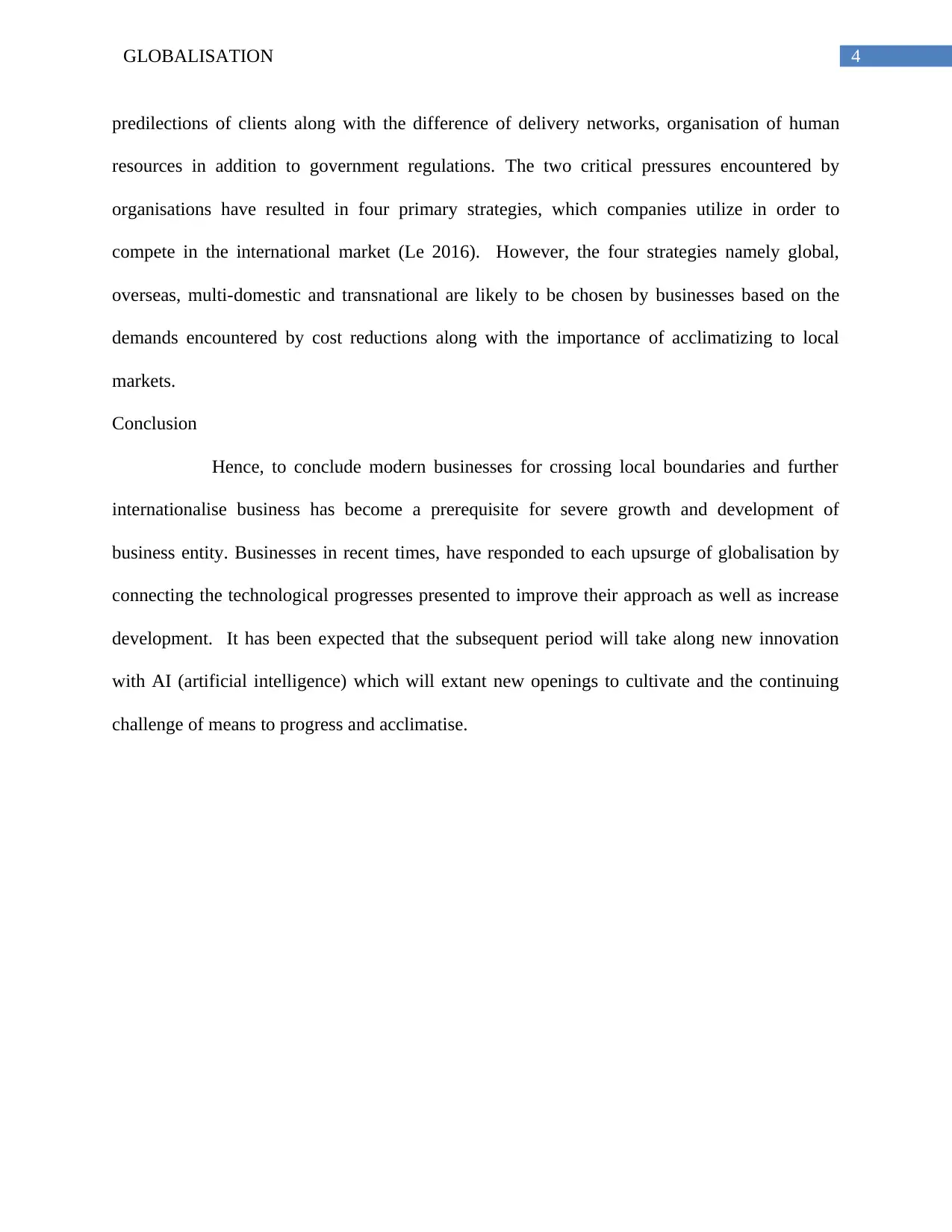
4GLOBALISATION
predilections of clients along with the difference of delivery networks, organisation of human
resources in addition to government regulations. The two critical pressures encountered by
organisations have resulted in four primary strategies, which companies utilize in order to
compete in the international market (Le 2016). However, the four strategies namely global,
overseas, multi-domestic and transnational are likely to be chosen by businesses based on the
demands encountered by cost reductions along with the importance of acclimatizing to local
markets.
Conclusion
Hence, to conclude modern businesses for crossing local boundaries and further
internationalise business has become a prerequisite for severe growth and development of
business entity. Businesses in recent times, have responded to each upsurge of globalisation by
connecting the technological progresses presented to improve their approach as well as increase
development. It has been expected that the subsequent period will take along new innovation
with AI (artificial intelligence) which will extant new openings to cultivate and the continuing
challenge of means to progress and acclimatise.
predilections of clients along with the difference of delivery networks, organisation of human
resources in addition to government regulations. The two critical pressures encountered by
organisations have resulted in four primary strategies, which companies utilize in order to
compete in the international market (Le 2016). However, the four strategies namely global,
overseas, multi-domestic and transnational are likely to be chosen by businesses based on the
demands encountered by cost reductions along with the importance of acclimatizing to local
markets.
Conclusion
Hence, to conclude modern businesses for crossing local boundaries and further
internationalise business has become a prerequisite for severe growth and development of
business entity. Businesses in recent times, have responded to each upsurge of globalisation by
connecting the technological progresses presented to improve their approach as well as increase
development. It has been expected that the subsequent period will take along new innovation
with AI (artificial intelligence) which will extant new openings to cultivate and the continuing
challenge of means to progress and acclimatise.
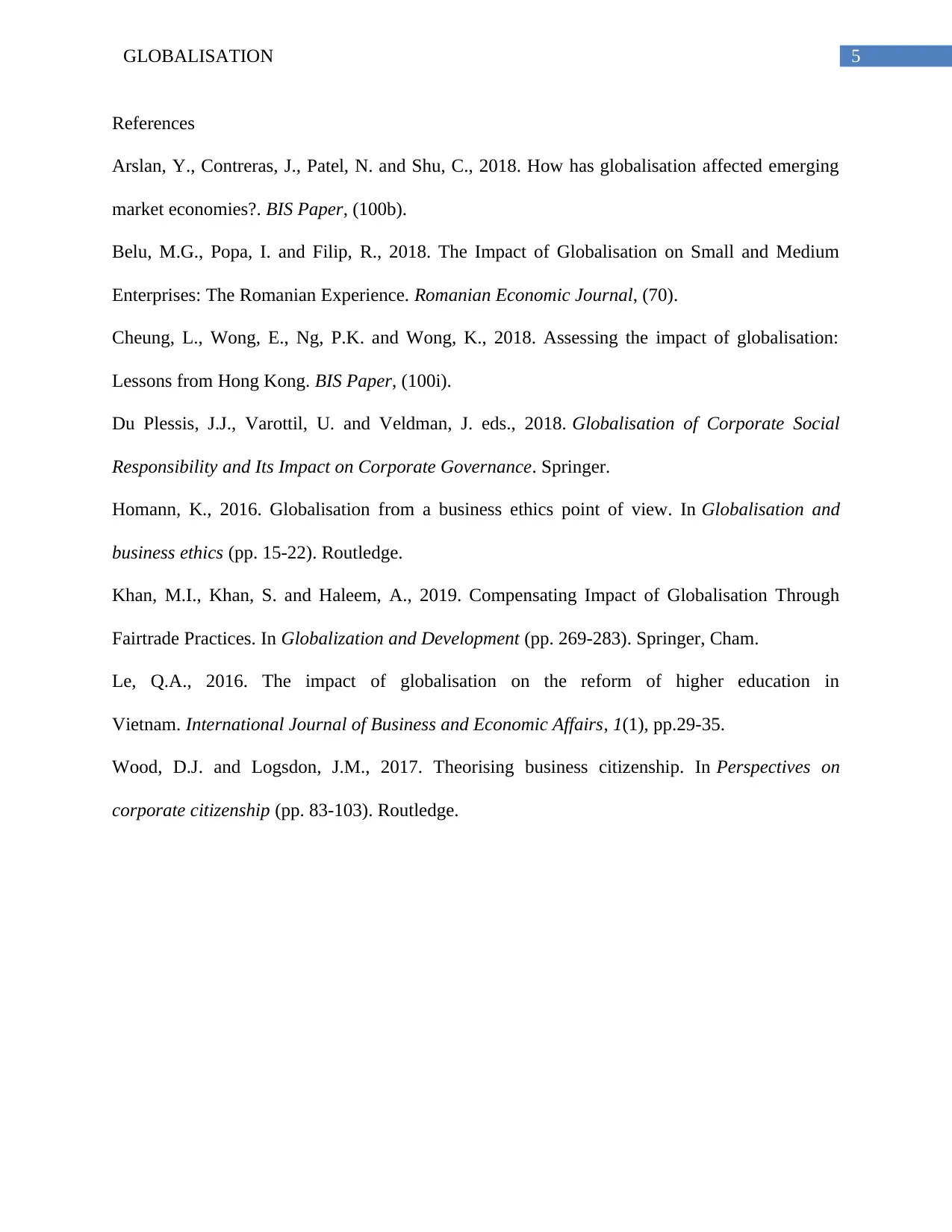
5GLOBALISATION
References
Arslan, Y., Contreras, J., Patel, N. and Shu, C., 2018. How has globalisation affected emerging
market economies?. BIS Paper, (100b).
Belu, M.G., Popa, I. and Filip, R., 2018. The Impact of Globalisation on Small and Medium
Enterprises: The Romanian Experience. Romanian Economic Journal, (70).
Cheung, L., Wong, E., Ng, P.K. and Wong, K., 2018. Assessing the impact of globalisation:
Lessons from Hong Kong. BIS Paper, (100i).
Du Plessis, J.J., Varottil, U. and Veldman, J. eds., 2018. Globalisation of Corporate Social
Responsibility and Its Impact on Corporate Governance. Springer.
Homann, K., 2016. Globalisation from a business ethics point of view. In Globalisation and
business ethics (pp. 15-22). Routledge.
Khan, M.I., Khan, S. and Haleem, A., 2019. Compensating Impact of Globalisation Through
Fairtrade Practices. In Globalization and Development (pp. 269-283). Springer, Cham.
Le, Q.A., 2016. The impact of globalisation on the reform of higher education in
Vietnam. International Journal of Business and Economic Affairs, 1(1), pp.29-35.
Wood, D.J. and Logsdon, J.M., 2017. Theorising business citizenship. In Perspectives on
corporate citizenship (pp. 83-103). Routledge.
References
Arslan, Y., Contreras, J., Patel, N. and Shu, C., 2018. How has globalisation affected emerging
market economies?. BIS Paper, (100b).
Belu, M.G., Popa, I. and Filip, R., 2018. The Impact of Globalisation on Small and Medium
Enterprises: The Romanian Experience. Romanian Economic Journal, (70).
Cheung, L., Wong, E., Ng, P.K. and Wong, K., 2018. Assessing the impact of globalisation:
Lessons from Hong Kong. BIS Paper, (100i).
Du Plessis, J.J., Varottil, U. and Veldman, J. eds., 2018. Globalisation of Corporate Social
Responsibility and Its Impact on Corporate Governance. Springer.
Homann, K., 2016. Globalisation from a business ethics point of view. In Globalisation and
business ethics (pp. 15-22). Routledge.
Khan, M.I., Khan, S. and Haleem, A., 2019. Compensating Impact of Globalisation Through
Fairtrade Practices. In Globalization and Development (pp. 269-283). Springer, Cham.
Le, Q.A., 2016. The impact of globalisation on the reform of higher education in
Vietnam. International Journal of Business and Economic Affairs, 1(1), pp.29-35.
Wood, D.J. and Logsdon, J.M., 2017. Theorising business citizenship. In Perspectives on
corporate citizenship (pp. 83-103). Routledge.
1 out of 6
Related Documents
Your All-in-One AI-Powered Toolkit for Academic Success.
+13062052269
info@desklib.com
Available 24*7 on WhatsApp / Email
![[object Object]](/_next/static/media/star-bottom.7253800d.svg)
Unlock your academic potential
© 2024 | Zucol Services PVT LTD | All rights reserved.





